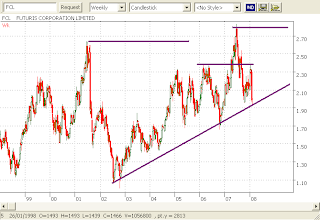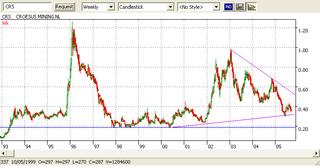I have previously made mention of the agricultural commodities - and the potential of companies like Qld Cotton, Namoi Cotton, Australian Wheat Board, Graincorp and Australian Agricultural Company. Since that time, we have seen the takeover of Qld Cotton by a Singapore-based company, and AWB hit by a number of law suits. The problem is that there isnt much exposure to the agricultural sector on the Australian ASX. The bulk of farms remain private family corporations. I suspect this is about to change for 2 reasons:1. High levels of debt
2. Drought has undermined revenues
3. Hedging debacles
4. Rising costs for inputs, eg. Fuel, fertiliser, insecticide
5. Low prices for alot of commodities
6. A strong $Aust - now $0.87 to $US
Travelling through the Northern Territory, Qld and NSW, it was readily apparent to me that:
1. Farmers in the North are till benefiting from very good unseasonal rains in May'07 even though crop farmers are watching their crops fail. Pastures in the north are well grassed.
2. Some commodity prices are up, but some are down due to drought, mixed fortunes of those crops used by biofuel production.
3. Input prices like fuel and fertiliser have increased considerably in the last 6 months
So I think farm failures are going to result in a number of new ASX listings as agricultural commodities rise. Why do I think agricultural commodity based stocks are going to perform well:
1. More takeovers - from Japanese, Chinese, local and US companies particular
2. Higher commodity prices - stronger demand for beef from Asia in particular, strong demand for grains for energy and feed, the flow through of input prices
3. Final end to the drought
4. Consolidation of family farms offering expansion upside
5. Growing speculation on agricultural based commodities by financial institutions
Its not a sector that I know much about but I would also expect trading in water rights to be brisk and I suspect a lot of money will be made there. But as far as equities are concerned, I like Australian Agricultural Company (AAC) because:
1. It is a well managed company
2. It is a pure beef exposure - pasture and feedlots
3. The outlook for beef demand in Asia I think is particularly good
4. Geographic diversity - they own 1.2% of Australia (8mil hectares), with their stock dispersed among a multitude of properties - se www.aaco.com.au 5. Improving rainfall - despite the drought, the rainfall in the Carpentaria region (West Qld) is has been increasing over the last 50 years. The paddocks are currently well grassed.
6. The prospect of the drought ending - this is already the worst drought since the 1930s
Technically the AAC chart looks good as it consolidates at its moving average. Currently trading at $2.75, with an earnings yield of just 1.1% and a dividend yield of 5%. This implies to me that the stock is only just recovering from drought-affected earnings. The clear intent here is to position in a stock that will benefit from those unseasonal rains, higher future commodity prices and any cessation to the drought - when it finally comes. Given that we are breaking 100yr records, the end to the drought cant be too far off. In case you are thinking that the drought is really climate change - consider that over the last 50 years, the locations of AAC properties have actually benefited from a significant increase in rainfall - thats in the Carpentaria region.

 The bulk materials like coal, iron ore, alumina have faired a lot better than the base metals like nickel, copper, lead and zinc, so one might consider Alumina Ltd (AWC.ASX) a good buy because its going to benefit from a weaker AUD, but its been dragged down by other commodity stocks. China does not have bauxite to my knowledge, so given the opportunity for Chinese (govt) owned corporations to launch takeovers, this might be expected to be a compelling takeover target. I'm a little outdated, but if you check Google Finance, I think you will find Rio Tinto and Alcoa each own a good portion of this corporation. The question is whether it would be up for sale. Interestingly Alcoa is helping the Chinese government block the BHP Billiton takeover of Rio Tinto, so maybe they are is a 'kickback' in terms of giving the Chinese a stake in Alumina.
The bulk materials like coal, iron ore, alumina have faired a lot better than the base metals like nickel, copper, lead and zinc, so one might consider Alumina Ltd (AWC.ASX) a good buy because its going to benefit from a weaker AUD, but its been dragged down by other commodity stocks. China does not have bauxite to my knowledge, so given the opportunity for Chinese (govt) owned corporations to launch takeovers, this might be expected to be a compelling takeover target. I'm a little outdated, but if you check Google Finance, I think you will find Rio Tinto and Alcoa each own a good portion of this corporation. The question is whether it would be up for sale. Interestingly Alcoa is helping the Chinese government block the BHP Billiton takeover of Rio Tinto, so maybe they are is a 'kickback' in terms of giving the Chinese a stake in Alumina.














